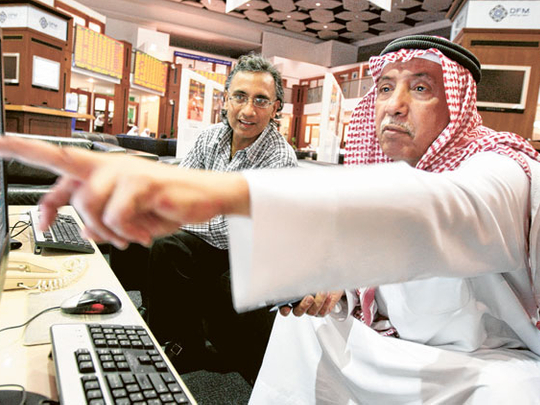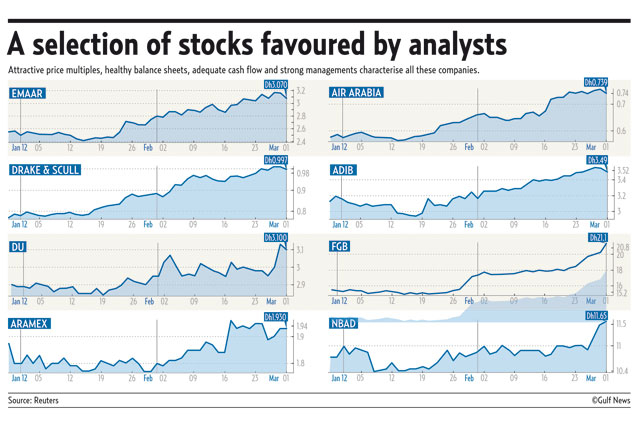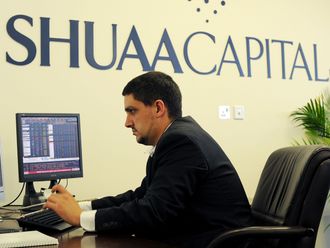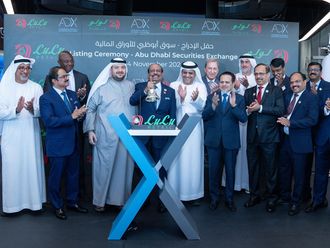
Dubai: As the UAE markets maintain their upward momentum, many investors might be wondering whether the rally has legs and, more importantly, whether it's a good idea to invest right now considering that some stocks have already gained close to 30 per cent, not to mention a couple which have crossed 100 per cent.
Certain indicators indeed suggest a turnaround, which some observers are even terming a ‘bull run'. In a matter of six weeks the value traded on the Dubai Financial Market (DFM) has seen an incredible jump from Dh25 million a day to the current Dh700 million. The DFM index is up 24.3 per cent this year, the highest in the region, with Abu Dhabi gaining a modest 9.2 per cent.
The shift in global sentiment — which comes against a backdrop of positive data in the US and the avoidance of a Greek default in Europe — has undoubtedly improved sentiment regionally.
Local catalysts have also had an effect. Corporate results in the fourth quarter were better than expected. Banks making steady progress, both in deposit and loan growth, and the high but manageable price of oil have all helped to attract fresh liquidity into both the markets.
Meanwhile the renewed interest has not only come from local, but also foreign investors. The value of shares bought by foreign investors last month reached Dh1.03 billion, which was 47.7 per cent of turnover.
"We believe that this rally was overdue in some way in technical terms," says Shakeel Sarwar, head of asset management at investment bank Securities and Investment Co, Bahrain.
"We believe that there's fundamental ‘legs' to the rally too. Globally, investor risk appetite has improved significantly. While equities markets, both developed (the US market is up 10 per cent year to date) and emerging (MSCI Emerging Markets Index is up 17 per cent year to date) have appreciated, flows to emerging markets funds have increased. The real estate prices, especially in Dubai, appear to have stabilised."
Confidence was the missing link that kept the stock market depressed with trading volume hitting the ultimate low, says Tarek Qaqish, deputy head of asset management at Al Mal Capital, Dubai, adding that it came to a point when the market no longer had any sellers. And so from there, the "prices could only go up."
Haissam Arabi, chief executive of Gulfmena Investments, Dubai, says that this recovery is coming from a low base. "There's plenty of room to make up for, given the last two years' under-performance — unjustifiably so, when you look at the numbers," he says.
Despite a more than 30 per cent rally, Talal Touqan, head of equity research at Abu Dhabi-based Al Ramz Securities, points out, "we have so far only recovered nine per cent of the major plummet we sustained from 2008 to 2009, while other GCC markets have recouped an average in excess of 30 per cent."
Growth
And on a macro level, Arabi says, "you are seeing GDP growth [expected to grow 4 per cent this year], and so, definitely I think that this time around we have legs. In general, we have stepped into a year when the market has turned into a bull market."
In January, Deutsche Bank reported the property index was up 2.2 per cent, the highest in 30 months. Concrete efforts by Union Properties, which restructured its loans, and Aldar's steps to allow it to sell their assets to resolve problems of debt or funding, contributed to positive sentiment in the sector. The UAE's construction sector is predicted to reach to an estimated $15.1 billion worth of new contracts in 2012.
"Look at where we are today — it's been night and day in terms of market performance, in terms of volumes, in terms of breadth of interest that we have seen, the number of clients that are transacting, the nature of those clients, and breadth across the various equities," says Tarek Lotfy, managing director of capital markets at Arqaam Capital, Dubai.
In fact, last month on the DFM, the real estate and construction sector ranked first in terms of the value of traded shares at Dh1.3 billion, which was 58.4 per cent of the market turnover. The banking sector ranked second at Dh348.9 million (16.1 per cent).
"Psychologically, the current upsurge has created a positive shock that is leading traders to slowly switch from the path of fear-regret-to-anxiety to a path that starts with hope and develops to an aspiration, and finally to a late mentality of greed," says Touqan.
All expect short-term corrections along the way. Bouts of profit-taking, as that seen on the DFM on Thursday when the market slipped 1.68 per cent, will be a feature in the days ahead.
"It's only natural when you see prices go up 20-30 per cent, the market taking some sort of a breather," says Arabi.
In the near term Salem Khokhar, head of equities, National Bank of Abu Dhabi, expects some volatility because there are several factors which could cause the markets to correct and for profit-taking to kick in. He alludes to stocks such as Arabtec, which has soared more than 130 per cent. Tabreed is another, which is up 180 per cent and most agree such gains are fundamentally unjustifiable.
"Stocks such as Arabtec have risen very strongly on significant volumes, but there has been a lack of transparency as to the true reason behind the rally, on publicly available information valuation is high but this would not necessarily preclude the stock from rallying further based on speculation of mergers and acquisitions and project wins," Khokhar explains.
Solvency
Are we out of the woods? Perhaps not. The solvency of Dubai's government-related entities is still in an uncertain state in 2012, says Touqan. "These risks, along with a demand-supply gap risk in the real estate sector represent additional challenges to local banks in the form of provisions and as an economic obstacle for other sectors," he adds.
International factors also could be a spoiler. "Not only do Europe and US debt challenges remain unresolved, but closer home the regional geopolitics surrounding Iran is a risk investors should always keep monitoring," says Qaqish.













